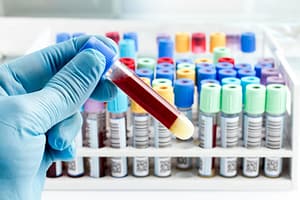Medical and Clinical Laboratory Technicians are part of The Strong Interest Inventory® Test Realistic Theme Code Category. The Strong Interest Inventory® uses individuals’ interests and personal and work preferences to identify careers which will be particularly fulfilling, appealing, and possibly long-term commitments for them. This assessment was first released in the aftermath of World War I, and has been refined since then to become a powerful tool in the world of career and interest inventories. The Realistic Theme Code Category revolves around being physically active and working with one’s hands. Individuals who score highly in the Realistic Category tend to enjoy having specific instructions, and achieving specific goals rather than having abstract problems to solve as they see fit.
Medical and Clinical laboratory technicians generally work under the supervision of a medical technologist to run a wide range of laboratory tests that help diagnose, treat, and prevent diseases. They collect blood, urine, or tissue samples from patients, and then conduct chemical analyses of them, often using a microscope as well as an automatic analyzer. They then enter their findings into a computer so that other technicians, assistants, and medical professionals can access them. In many cases, they then meet with pathologists or doctors to determine a final diagnosis for an individual patient, or to write papers or produce presentations if a larger-scale study is being conducted. Medical and clinical laboratory technicians also maintain, calibrate, and clean the laboratory and its equipment. This may include preparing standard volumetric reagents that are used frequently in the lab, preparing samples for analysis by staining or mounting them, testing raw materials or processes to ensure their quality. Depending on the size of the lab, they may need to supervise or train assistants or interns.
In order to successfully complete their tasks, laboratory technicians need to be able to work with a wide range of medical, analytical, computing, and biological equipment. From typical lab equipment like test tubes, petri dishes, microscopes, hot plates, and pipettes, to high-tech machines like refractometers and polari meters, centrifuges, blood bank analyzers, and chemistry analyzers. They also need to be comfortable working with syringes, butterfly needles, incubators, cell counters, pH meters, and platelet mixers, especially when dealing with biological samples. In larger laboratories, parts of the process may be automated, requiring that technicians be familiar with spectrometers, robotic or automated liquid handling systems, and sterilizing machines. Those who have direct patient contact also often use tourniquets, blood collection tubes, IVs, and other forms of sampling. In addition to “hardware”, lab technicians also use a range of technologies, including billing software, database software, and medical software (e.g., EMR, MEDITECH), as well as the now-ubiquitous Microsoft Office Suite and Email software.

Read about a career as a Medical and Clinical Lab Technician including information such as a Lab Technician’s salary, daily responsibilities, required education and other career information.
46% of Lab technicians have a Bachelor’s Degree, while 31% hold an Associate’s Degree and 10% have obtained a Post-Baccalaureate Certificate. In their degree programs, they build a strong background in biology, chemistry, mathematics, and physics, all of which are absolutely essential to their jobs. They also need to be able to communicate confidently in English, both in speaking and writing, and need to have strong listening, reading comprehension, and critical thinking skills. In addition, they need to be able to make judgments quickly and sometimes with limited information, and manage their time effectively, even when they have large amounts of work to complete. Near-vision and manual dexterity are of the utmost importance, as are the abilities to distinguish fine visual colors and conducting quick mental calculations.
Medical and clinical lab technicians’ salaries can vary over $40,000 annually, depending on the state of residence and degree of experience of the technician. In California, the best paid technician’s salaries can be over $68,000 annually, especially in the San Francisco area, while the lowest paid technicians, for instance in the Texas panhandle, can make as little as $25,000 annually. That said, employment trends are rapidly increasing, projected over 10% in 40 states before 2024. Colorado and Utah are the fastest growing markets, though the medical lab technician salary in Colorado (nearly $60,000) is much closer to the national average than Utah’s, which lags at $48,000.
Below are some employment trends for Lab Technicians:
- Lab Technician Salary: $25.54 hourly, $53,120 annually
- Employment: 331,700 employees
- Projected growth (2018-2028): Much faster than average (11% or higher)
- Projected job openings (2018-2028): 25,500
Visit Our Strong Interest Inventory® Resource Page
Visit Our Myers-Briggs Type Indicator® Career Resource Database for Information on MBTI® Personality Type Careers
To Learn More About the Myers-Briggs Type Indicator, visit our About MBTI Test Page
Click on one of these to access more Realistic Theme Code Careers: Acupuncturist, Airline Pilot, Animal Trainer, Anesthesiologist Assistant, Baker, Barber, Bus Driver, Civil Engineer, Cardiovascular Technologist and Technician, Medical and Clinical Lab Technician, Computer Support Specialist, Game Warden, Forest Firefighter, Heating and Air Conditioning Mechanics, Recreational Protective Service Worker, Meat Trimmer, Molecular and Cell Biologist, Nanotechnology Engineering Technician, Oral and Maxillofacial Surgeon, Pathologist, Plumber, Radiologist, Police Patrol Officer, Surveyor, Telecommunications Engineering Specialist, Veterinarian, Veterinary Technologist and Technician, Welder, Zoologist and Wildlife Biologist.
Explore our Strong Interest Inventory® Blog Pages:
- Strong Interest Inventory Realistic Theme Explained
- Strong Interest Inventory Artistic Theme Explained
- Strong Interest Inventory Investigative Theme Explained
- Strong Interest Inventory Social Theme Explained
- Strong Interest Inventory Enterprising Theme Explained
- Strong Interest Inventory Conventional Theme Explained
Assessment Categories
References
- Bureau of Labor Statistics wage data and 2012-2022 employment projections Onetonline.org










